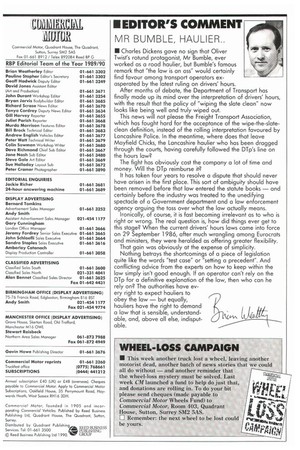MR BUMBLE, HAULIER..
Page 5

If you've noticed an error in this article please click here to report it so we can fix it.
• Charles Dickens gave no sign that Oliver Twist's rotund protagonist, Mr Bumble, ever worked as a road haulier, but Bumble's famous remark that "the law is an ass" would certainly find favour among transport operators exasperated by the latest ruling on drivers' hours.
After months of debate, the Department of Transport has finally made up its mind over the interpretation of drivers' hours, with the result that the policy of "wiping the slate clean" now looks like being well and truly wiped out.
This news will not please the Freight Transport Association, which has fought hard for the acceptance of the wipe-the-slateclean definition, instead of the rolling interpretation favoured by Lancashire Police. In the meantime, where does that leave Mayfield Chicks, the Lancashire haulier who has been dragged through the courts, having carefully followed the DTp's line on the hours law?
The fight has obviously cost the company a lot of time and money. Will the DTp reimburse it?
It has taken four years to resolve a dispute that should never have arisen in the first place. This sort of ambiguity should have been removed before that law entered the statute books — and certainly before the industry was treated to the unedifying spectacle of a Government department and a law enforcement agency arguing the toss over what the law actually means. Ironically, of course, it is fast becoming irrelevant as to who is right or wrong. The real question is, how did things ever get to this stage? When the current drivers' hours laws came into force on 29 September 1986, after much wrangling among Eurocrats and ministers, they were heralded as offering greater flexibility.
That gain was obviously at the expense of simplicity. Nothing betrays the shortcomings of a piece of legislation quite like the words "test case" or "setting a precedent". And conflicting advice from the experts on how to keep within the law simply isn't good enough. If an operator can't rely on the DTp for a definitive explanation of the law, then who can he rely on? The authorities have every right to expect hauliers to obey the law — but equally, hauliers have the right to demand a law that is sensible, understandable, and, above all else, indisputable.




































































































































